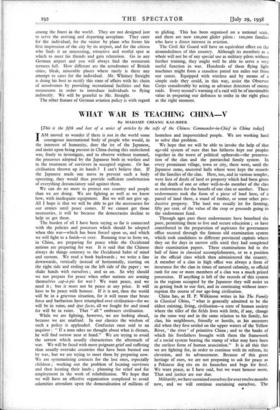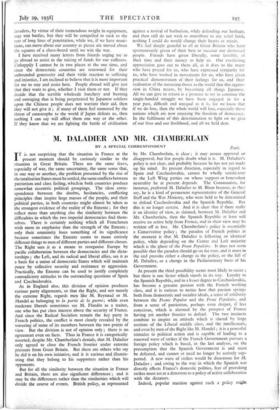WHAT WAR IS TEACHING CHINA -V
By MADAME CHIANG KAI-SHEK
[This is the fifth and last of a series of articles by the wife of the Chinese Commander-in-Chief in China today] T AM moved to wonder if there is not in the world some 1 courageous international body of people who would, in the interests of humanity, dare the ire of the Japanese, and insist upon being present in China during this undeclared war, freely to investigate, and to observe without trammel, the processes adopted by the Japanese both in warfare and in the treatment of survivors in occupied regions. Or has civilisation thrown up its hands ? I can't believe that. If the Japanese made one move to prevent such a body operating, they would thus provide sufficient confirmation of everything denunciatory said against them.
We can do no more to protect our country and people than we are doing. We are fighting as well as we know how, with inadequate equipment. But we will not give up. All I hope is that we will be able to get the necessaries for our armies until peace comes. If we cannot get those necessaries, it will be because the democracies decline to help us get them.
The burden of all I have been saying so far is connected with the policies and processes which should be adopted when this war—which has been forced upon us, and which we will fight to a finish—is over. Running true to form we, in China, are preparing for peace while the Occidental nations are preparing for war. It is said that the Chinese always do things contrary to the Occidental habit of mind and custom. We read a book backwards ; we write a line downwards, vertically instead of horizontally, starting on the right side and ending on the left side of the paper ; we shake hands with ourselves ; and so on. So why should we not prepare for peace when other nations are arming themselves cap-d-pie for war ? We want peace, and we need it ; but it must not be peace at any price. It will have to be peace with honour. If it is not, then the world will be in a grievous situation, for it will mean that brute force and barbarism have triumphed over civilisation—for we will be in ruins, and ipso facto, all we fought for and stood for will be in ruins. That " all " embraces civilisation.
While we are fighting, however, we are looking ahead, because we are unafraid. In our classics the wisdom of such a policy is applauded. Confucius once said to an inquirer : " If a man takes no thought about what is distant, he will find sorrow near at hand." We are trying to avoid the sorrow which usually characterises the aftermath of war. We will be faced with more poignant grief and suffering than usually overtake countries that have been burned out by war, but we are trying to meet them by preparing now. We are systematising contacts for the lost ones, especially children ; working out the problem of locating survivors and then locating their lands ; planning for relief and for employment in the work of rehabilitation. We hope that we will have an effective organisation completed to avoid calaMities attendant upon the demoralisation of millions of homeless and impoverished people. We are working hard to solve that problem.
We hope that we will be able to invoke the help of that age-old system of ours that has hitherto kept our peoples together in the worst of political upheavals—the preserva- tion of the clan and the patriarchal family system. In every prominent village, town or city, there were, until the Japanese came, ancestral halls where were kept the records of the families of the clan. Here, too, and in various temples, were lists of deeds of land or property which had been given at the death of one or other well-to-do member of the clan as endowments for the benefit of one clan or another: These endowments took the form of a piece • of land here, of a parcel of land there, a stand of timber, or some other pro- ductive property. The land was usually let for farming, fifty per cent. of the value of the crop or proceeds going• to the endowment fund.
Through ages past these endowments have benefited the poor, permitting them to live and secure education ; or have contributed to the preparation of aspirants for government office secured through the famous old examination system which took candidates to different provincial capitals where they sat for days in narrow cells until they had completed their examination papers. These examinations led to the hall of fame in classical • accomplishments, or to a position in the official class which then administered the country. A member of a clan in high office was always a form of insurance for the clan in times of natural calamity, so official rank for one or more members of a clan was a much prized possession. If anything is left of the records of this system in the regions occupied by the Japanese they will assist us in getting back to our feet, and in continuing without inter- ruption the course of our age-long civilisation.
China has-, as H. P. Wilkinson writes in his The Family in Classical China, " what is generally admitted to be the oldest existing, living, civilisation—a state of human society where the tiller of the fields lives with little, if any, change in the same way and in the same relation to his family, his clan, his neighbours, friendly or hostile, as his ancestors did when they first settled on the upper waters of the Yellow River, `the river' of primitive China ; and to the banks of which his forefathers brought with them the framework of a social system bearing the stamp of what may have been the earliest form of human association." It is all this that we are fighting for, in order to continue with its reform, its elevation, and its advancement. Because of this great heritage of ours, we are not proposing to ask for peace as a Pekinese dog sits on its haunches and begs for food. We want peace, as I have said, but we want honour more. That and justice are our due.
Militarily, we have sustained ourselves for over twelve months now, and we will continue sustaining ourselves. The invaders, by virtue of their tremendous weight in equipment, may win battles, but they will be compelled to stick to the ruts of long lines of penetration, while we, if we have muni- tions, can move about our country as pieces are moved about the squares of a chess-board until we win the war.
I have received many letters from friends urging me to go abroad to assist in the raising of funds for our sufferers. Unhappily I cannot be in two places at the one time, and since the democratic countries are renowned for their unbounded generosity and their virile reaction to suffering and injustice, I am inclined to believe that it is more important for me to stay and assist here. People abroad will give just that they want to give, whether I visit them or not. If they decide that the terrible wholesale, butchery and burning and outraging that is being perpetrated by Japanese soldiers upon the Chinese people does not warrant their aid, then they will not give it ; if many of them feel unmoved by the threat of catastrophe to the world if Japan defeats us, then nothing I can say will affect them one way or the other. If they know that we are fighting the battle of civilisation against a revival of barbarism, while defending our heritage, and then still do not wish to contribute to any relief fund, nothing I could do would change their hearts or minds.
We feel deeply grateful to all in Great Britain who have spontaneously given of their best to succour our distressed people. Friends have given liberally, some lavishly, of their time and their money to help us. Our everlasting appreciation goes out to them all, as it does to the many who have prayed for us, who have expressed sympathy for us, who have worked in movements for us, who have given practical demonstration of their feelings for us, and their realisation of the menacing threat to the world that this aggres- sion in China means, by boycotting all things Japanese. All we can give in return is a promise to try to continue the single-handed struggle we have been engaged in for a year past, difficult and unequal as it is, for we know chat if we do lose, then the whole world will lose, especially those nations which are now enjoying the freedom of democracy. In the fulfilment of this determination to fight on we give of our lives and our livelihood, and all we held dear.



































 Previous page
Previous page